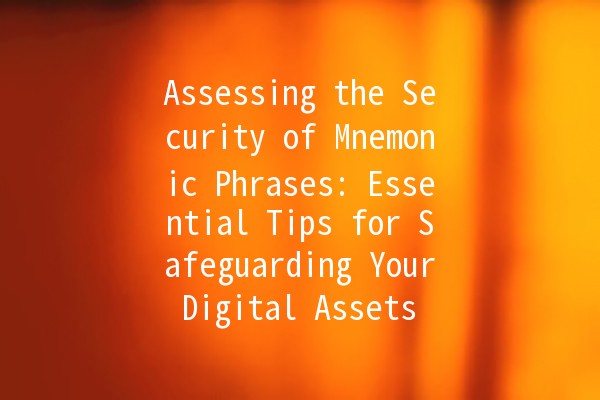
Mnemonic phrases, commonly used in cryptocurrency wallets, serve as a bridge between users and their digital assets. While they are essential for securing access to your funds, assessing their security involves understanding various risks and implementing effective mitigation strategies. In this article, we'll explore practical tips to enhance the security of your mnemonic phrases, ensuring your digital assets remain safe from potential threats.
Understanding Mnemonic Phrases
Mnemonic phrases are a set of words utilized in cryptographic systems to help users recover their wallets. Typically consisting of 12 to 24 words, they act as a key that unlocks access to your cryptocurrencies. Each word in the phrase corresponds to a specific value in a predetermined list, making it possible for the wallet software to regenerate your private key.
Potential Risks to Mnemonic Phrases:

Practical Tips for Enhancing Mnemonic Phrase Security
Here are five concrete tips to boost the security surrounding your mnemonic phrases:
Explanation: Keeping your mnemonic phrase offline significantly reduces the risk of digital theft.
Application Example: Instead of storing your phrase in a digital note or cloud service, write it down on a physical medium like paper or store it in a dedicated hardware wallet. Ensure the location is secure, such as a safe or a safety deposit box.
Explanation: Hardware wallets provide a secure environment to store your mnemonic phrases and interact with your cryptocurrencies without exposing your keys to the internet.
Application Example: Invest in reputable hardware wallets like Ledger or Trezor. When you create a wallet, these devices will generate and store your mnemonic phrase internally, only asking you to confirm transactions while your keys remain offline.
Explanation: Adding an additional layer of security with strong passwords can protect your wallet software and any software that interacts with your mnemonic phrase.
Application Example: Use a password manager to generate complex passwords, combining upper and lowercase letters, numbers, and symbols. Avoid common phrases or easily guessable information. For added security, enable twofactor authentication (2FA) wherever possible.
Explanation: Many people fall victim to phishing scams that aim to steal mnemonic phrases. Educating yourself on common tactics is essential for protecting your assets.
Application Example: Always verify the URLs of the websites you visit before entering any sensitive information. Be wary of unsolicited emails or messages asking for your mnemonic phrase or wallet keys. Legitimate services will never ask you for this information.
Explanation: Technology and tactics used by attackers are constantly evolving, making it essential to stay updated on the latest security measures.
Application Example: Follow reputable cryptocurrency blogs, forums, or news outlets to stay informed about potential threats and security practices. Periodically review and update your security methods and, if necessary, regenerate your mnemonic phrases, especially if you suspect any compromise.
Assessing and enhancing the security of mnemonic phrases is paramount for ensuring the safety of digital assets. By implementing the tips outlined above, users can significantly reduce their exposure to risks and safeguard their hardearned cryptocurrencies. Maintaining best practices won’t simply protect your mnemonic phrases; it will also enhance your overall cryptocurrency experience.
Frequently Asked Questions (FAQs)
A mnemonic phrase is essential for accessing and recovering your cryptocurrency wallet. It acts as a password that allows you to control your digital assets securely.
Yes, you can use a single mnemonic phrase to recover different wallets, provided they are generated under the same standard (like BIP39). However, it's generally safer to have separate phrases for added security.
If you are no longer using an old mnemonic phrase, ensure it is securely destroyed. For physical copies, consider using a shredder; for digital notes, use software that irreversibly deletes files.
Hardware wallets store private keys offline, making them less susceptible to hacking and malware. Software wallets, being online, can be targets for cyberattacks, phishing, and malware.
Never share your mnemonic phrase with anyone, including friends, family, or customer support teams. Sharing your mnemonic phrase grants others access to your cryptocurrency and puts your assets at risk.
If you believe your mnemonic phrase has been exposed, immediately transfer your assets to a new wallet with a different mnemonic phrase, ensuring that the new phrase is stored securely.
By adhering to these practices, you can significantly bolster the security around your mnemonic phrases and enhance the protection of your digital assets.

